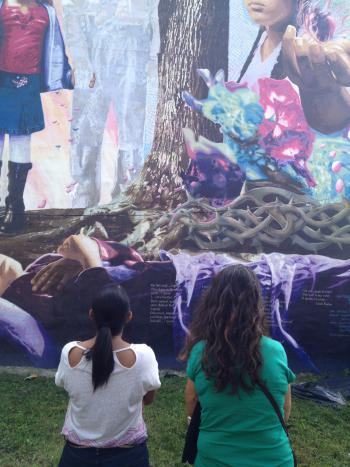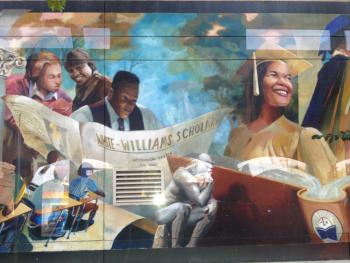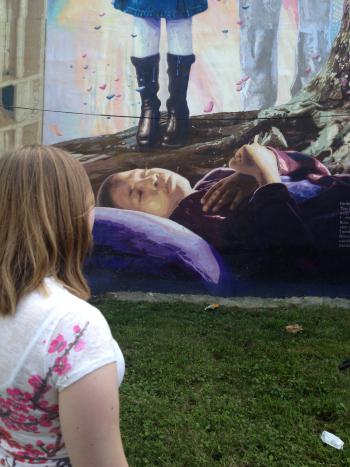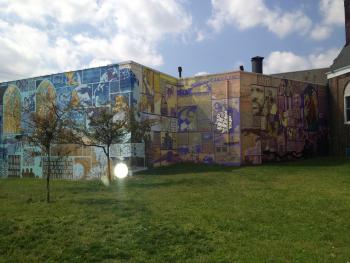Serendip is an independent site partnering with faculty at multiple colleges and universities around the world. Happy exploring!

Surprisingly Moved by a Human and Not the Arts
The most intriguing part of our Saturday trip was the mural arts tour. A lot of feelings and questions came up for me as we drove from one mural to the other with our tour guide. I was curious and somewhat taken aback by our tour guide who was also a former teacher in the public education system. If we think in terms of power in our society, his identity as a white male symbolizes the epitome of white privilege and supremacy. So, I was really surprised when he choked up while reading a student-written poem about despair and the harsh impact inner-city neighborhoods have on the minds and actions of young people. I was touched that he was touched and so, as I tried to play it cool and not tear up from the break in his voice, a streamline of questions popped intomy mind. Why did he care so much as a white man about students of color and this neighborhood? What reaction was he trying to get out of us? If he cared so much, why wasn't he still teaching? What exaclty moved him about this student's words...voice? Did he see a reflectionof himself? What's his background?

Questions, questions...
You'll find here the photos I took during our visit to Eastern State y'day. Very evocative…and troubling.
So much to think through (for me as a Quaker, especially....), about a vision gone wrong in so many ways…
I didn't take any photos during the mural tour, though--in part because I found it hard to see, and assumed I could find better images on-line than I could take from the trolley. But there's lots more I'd like to discuss about that whole experience--from what it means to ride around on a trolley through poor neighborhoods (while being urged to "wave @ everyone!"); through getting off the trolley and viewing murals, while the neighbors are making music across the street; to what it really means to "make art that represents a community."
I'm hoping that Jody, Sarah and Uninhibited will be able tell us something about the process that went into making the mural about women's education, which they helped to create in the first 360°. I attended one of the early concepting sessions; saw Jody, Sarah and Jomaira and Sharaai posed @ work on the front page of the Alumnae Bulletin...

Silence: More Malleable Than Evolutionary
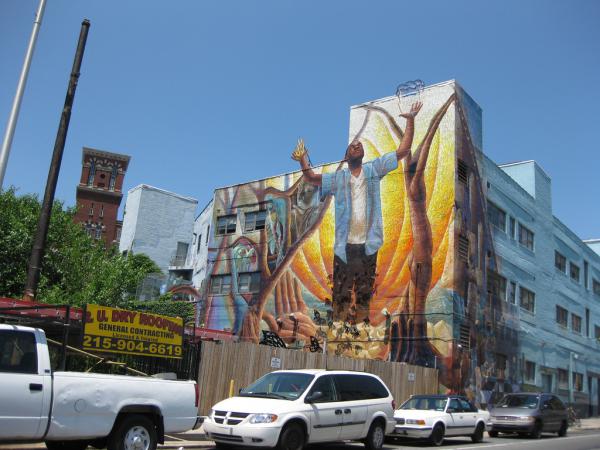
While brainstorming what to write for this second web event, an image, similar to the way Irene’s bedroom struck me, kept popping up in my head from the mural arts tour in Philly. It was the mural of the iron butterflies protruding and ascending up the body of an African-American man holding fire in the palm of one of his hands. If I am not mistaken, the mural was created on the back of a men’s shelter that no longer existed and the butterflies symbolized the great changes—the metamorphosis—the sheltered men made in their own lives. I, too, had written about the concept of metamorphosis and had described the role silence had played in my life as an evolution. However, as I began to think more about the nature of the word, metamorphosis, I grew dissatisfied with my word choice in describing the role of silence in my life.
Sunday Morning at the BM Labyrinth
Detached Moment
Cold in the morning.
Hammock was damp.
Bench was in shade.
Grass was thick and green, nourished by last night's rain.
Sunshine was soft and clear,
and the sun was hiding from me behind the huge pine-like tree.
Walking in the Labyrinth,
not thinking about the route.
Each step brings me to a new angle of view.
Athletic training was going on at the Applebee.
Sunshine gloriously projected on the wall of Rhoads.
Squirrels sneakily jump up and down the trees.
My hot drink was cooled.
I walked faster to keep myself warm.
One part of the Labyrinth was in the sun:
just like the most inviting slice of pizza - tempting.
I ignored the route I was walking on
and indulged in the gentle slow air flow,
the clear sky
the grass dew
the walk
the pleasant quiet alone hour
the meditation.
*Side notes:
I spent six minutes walking from the start to the terminal, which was way less time than one time that I cheated. But I felt the course of time should be longer. It reminds me of the Wellness course of last week where we closed our eyes and followed the instruction to breath in and out, which was an extremely relaxing exercise. That was another time when the psychological time I experienced was longer than the physical time. Whenever I am indulged in something, I feel I am doing more with my time.

Voice paper #1
Assignment #1:
Pose and address a question/dilemma/claim about “voice” and the classroom, or, more broadly, about voice and learning.
Consider these questions if/as useful:
How are you understanding/defining “voice”?
What do you see as the promise and/or the challenges of students (and others) finding and using their/our voices in learning? In schooling?
How do you understand the relationship between “voice” and listening? voice and dialogue? What part might performance play?
You might want to think about these (and other) questions in terms of gender and/or in terms of learning in particular contexts and spaces (e.g. classrooms, prison, theatre, life).
Draw on texts (our shared texts and, if you want, others that are relevant) as well as experiences, again if and as relevant.
Some thoughts about finding your way in/delving into your paper:

Colleges, Prisons, and Hospitals: A Semester in Three Walled Communities
“When a woman tells the truth she is creating the possibility for more truth around her.”
---Adrienne Rich
I live in the walled community of Haverford College but also in a second institution—the hospital.
I don’t know why I haven’t spoken of these experiences in class. Or maybe that’s a lie because I know exactly why. At any given moment I am either in searing pain, trying to discretely smother the flames burning down my arm, or else I am using all my mental capacity to follow discussion while my brain is hazy from pain medication.

Web event #2: Can I speak for you? Can I be silent for you?
I started this class thinking silence was a finite task, one that I would struggle to “complete”, as if that would be even possible. I moved from shallowly thinking it was all about pulling myself out of the noise of modern technology to frustration with the rhetoric of silence as a political statement. Now I’m working more and more toward a knowledge that silence is with me daily, in those ways that I have been wary of, like taking time to be completely silent, but also in what I refrain from saying when I am speaking. Specifically, I have found myself thinking about and responding to Hummingbird’s paper on self-silencing, and our class discussions about who may presume to speak for someone else. Do they have to be of the same background racially? Do their genders (and their perceptions of what that means for their daily life) need to match up? Do they have to be from the same socio-economic class to speak to the privilege or lack thereof that accompanies varied levels of wealth? Can I, as only barely culturally Jewish, even speak to that side of myself as influencing my life? I don’t presume that there will ever be a definitive answer to any of these (although there are definite opinions that I have read and heard expressed, both in class and in readings). I do hope, though, to create a greater understanding of silence as ever-present, especially in my exploration of self-silencing personally in the context of speaking for someone else, as their story may relate to others or me.

Web Event #2: Silenced by a lack of Silence
Webpaper 2
Lately, I’ve left our class with anger nipping at my heels as I trudge back to Denbigh. Thoughts, complaints and unspoken words swirl through my already over-full mind and I just want to scream. But I don’t. Instead, I shut myself in my room and wish I had splurged for that journal I saw in the bookstore a week ago. It seems wrong, but out of desperation and lack of proper medium, I’ve turned to this essay to help me sort out my thoughts regarding my own role in our class, and also the role of silence.
I am exhausted when I leave our class. I feel the weight of my unpacked thoughts making me so heavy. My silence, I will readily admit, is self-imposed, but I won’t take all of the responsibility. I feel silenced because I just need space to think. Such heavy topics deserve a response that has been thought out. But there is no time for silence. For it seems that we would much rather talk about it than observe it.


